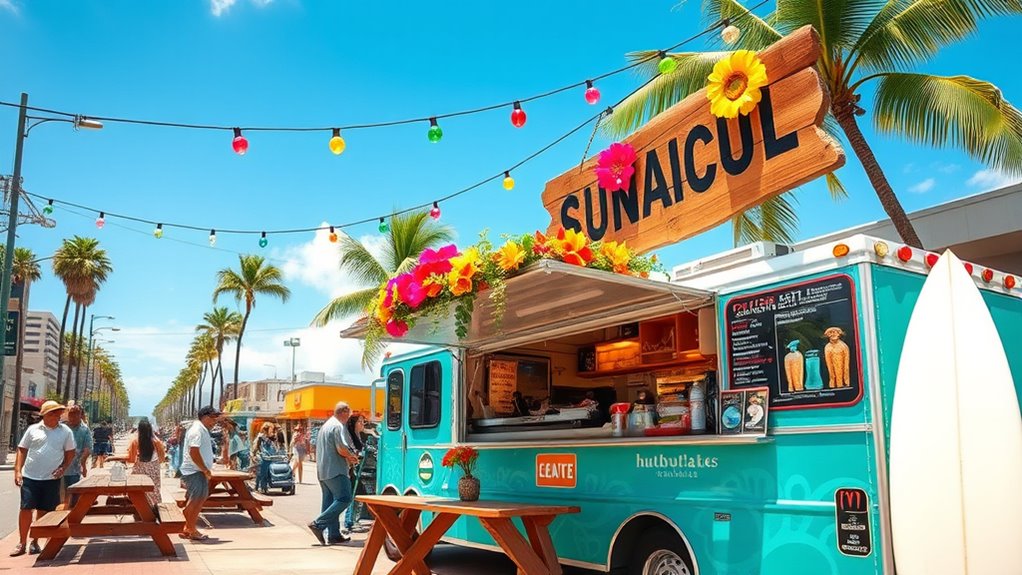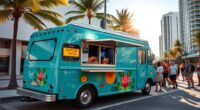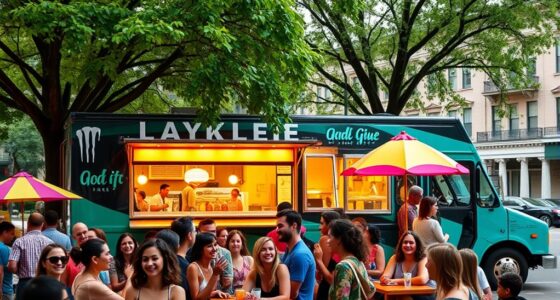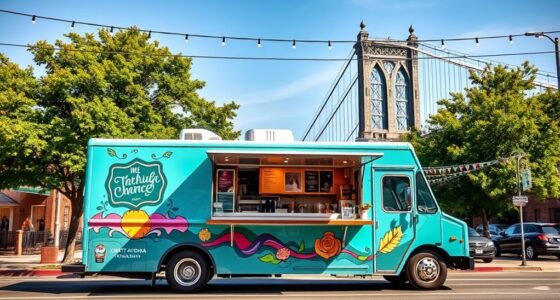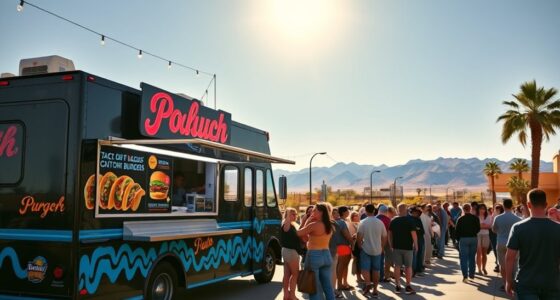Starting a food truck in Honolulu means embracing its diverse food scene and community values. You’ll need to navigate local permits, street vending zones, and sanitation standards, but online applications and clear regulations make it manageable. Focus on developing a menu with local ingredients, setting a smart budget, and creating a strong brand. Engaging with the community and using social media will help you grow. Keep exploring, and you’ll discover how to turn your food truck dream into reality.
Key Takeaways
- Obtain necessary permits and licenses through Honolulu’s online application portal, ensuring compliance with local regulations and zoning laws.
- Choose a suitable food truck vehicle, considering costs, maintenance, and customization options, and secure proper insurance coverage.
- Develop a menu featuring local ingredients, set competitive prices, and implement a customer loyalty program to attract repeat business.
- Select a designated street vending zone and adhere to parking and sanitation regulations to operate legally and smoothly.
- Engage with the community through social media and local events, emphasizing sustainability and authentic Hawaiian flavors to build brand loyalty.
Local Food Scene Overview
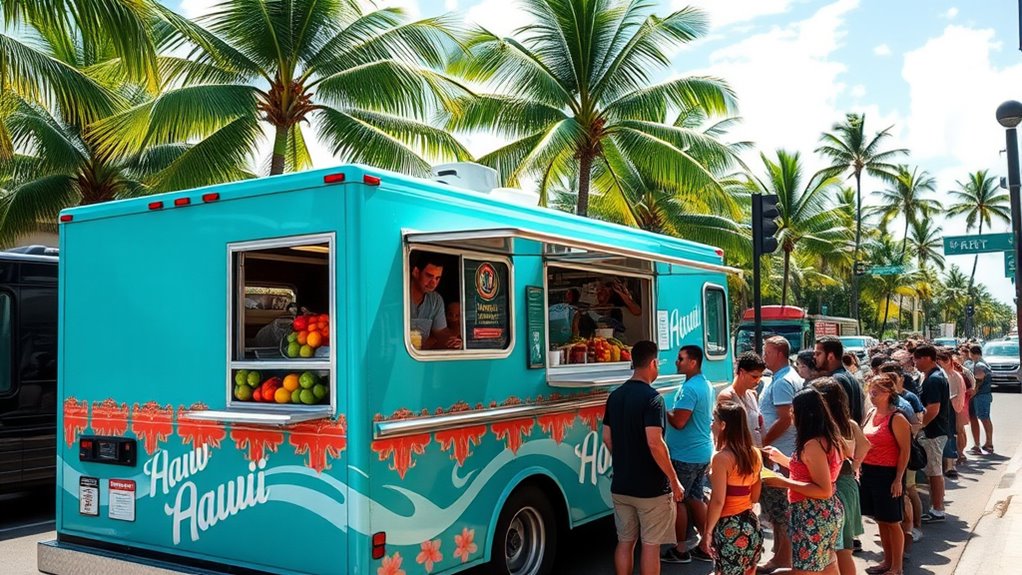
Have you ever wondered what makes Honolulu’s food scene so vibrant? It’s the mix of local food vendors and their culinary diversity that truly sets it apart. You’ll find a variety of flavors, from traditional Hawaiian dishes to international cuisine, all thriving in this bustling city. Local vendors bring authentic tastes and innovative twists, creating a dynamic food landscape. Whether you’re craving poke bowls, loco moco, or fusion dishes, Honolulu offers endless options. This diversity attracts both locals and tourists, making it a perfect spot for a food truck business. The rich mix of culinary influences guarantees a steady flow of customers eager to try something new, giving you ample opportunity to carve out your niche in this lively food scene. Additionally, the local food scene is supported by a community that values sustainability and fresh ingredients, which can be a key selling point for your food truck.
Understanding Local Requirements
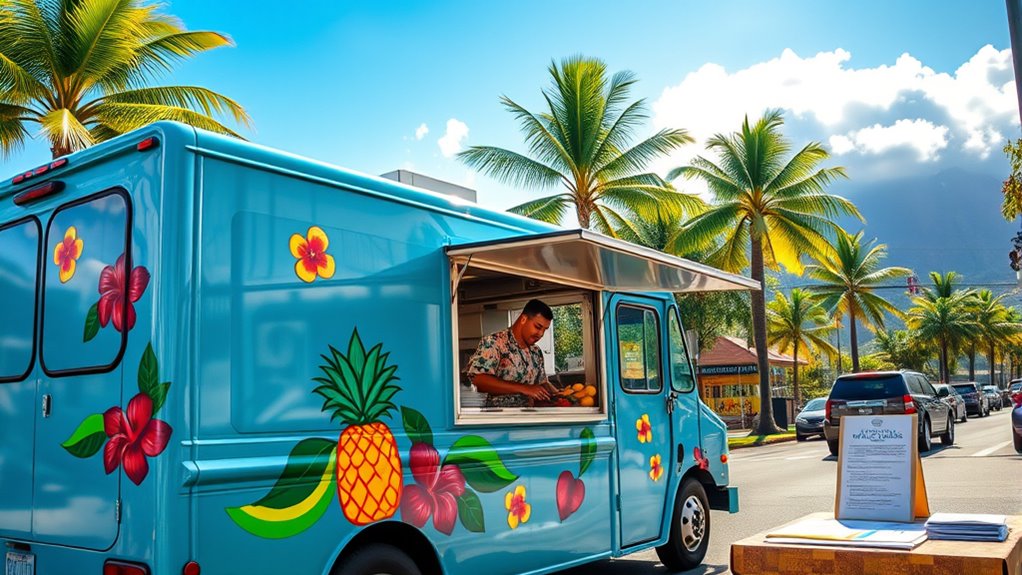
To get started, you’ll need to use the online permit application portal to submit your paperwork effectively. Make sure you follow routine sanitation procedures to meet local health standards, and familiarize yourself with the designated street vending zones. Understanding these requirements helps ensure your food truck complies with Honolulu’s regulations from day one. Be aware of the necessary cookie consent policies to ensure a smooth application process.
Online Permit Application Portal
Accessing the online permit application portal is the first step to understanding Honolulu’s local requirements for starting a food truck. This portal streamlines the online permit procedures, allowing you to submit all necessary documents digitally. Before applying, review the portal’s instructions carefully, and gather essential information like your business details, food safety plans, and vehicle specifications. Using digital application tips, guarantee your files are clear, correctly formatted, and complete to avoid delays. Check for any required fees and keep copies of your submissions. Navigating the portal confidently helps you stay organized and ensures your application moves smoothly through the review process. Familiarizing yourself with these steps saves time and keeps your plans on track for a successful food truck launch.
Routine Sanitation Procedures
Understanding Honolulu’s local sanitation requirements is essential for maintaining food safety and passing inspections. You must develop and follow strict sanitation routines and cleanliness protocols to meet health standards. Regular cleaning of equipment, surfaces, and utensils prevents cross-contamination and ensures food safety. Keep detailed logs of sanitation activities to demonstrate compliance during inspections. Be aware of local disposal rules for waste and grease, and ensure your staff follows proper handwashing procedures. Staying on top of these sanitation routines helps you avoid violations and maintains a safe environment for customers.
- Proper handwashing techniques and schedules
- Regular cleaning and sanitizing of all surfaces
- Waste disposal and pest control protocols
Designated Street Vending Zones
Knowing where you can legally set up your food truck is vital for avoiding fines and operational disruptions. Honolulu’s designated street vending zones are specific areas approved for food truck operations, and understanding these zones helps you comply with local regulations. You’ll need to review parking regulations carefully, as they dictate where you can park and serve customers. Securing the necessary vendor permits is also essential; these permits often specify the approved zones you can operate in. Operating outside designated zones or without proper permits can lead to penalties or shutdowns. Familiarize yourself with the city’s list of approved vending zones, and ensure your truck is parked legally within those areas. Staying compliant keeps your business running smoothly and helps you build a positive reputation in Honolulu.
Setting Up Your Base of Operations
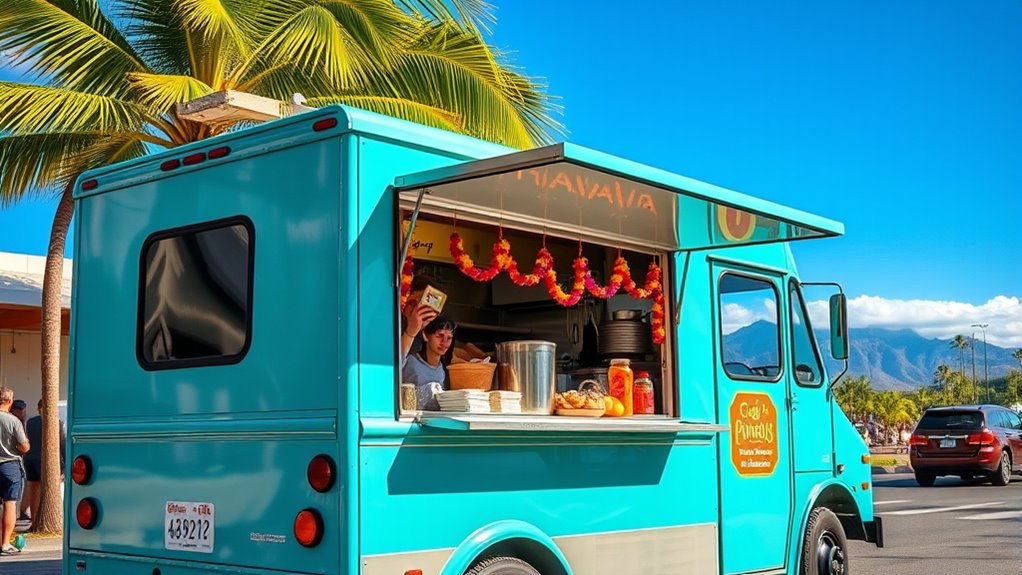
To set up your base of operations, you’ll need to understand shared kitchen licensing requirements and plan your kitchen layout accordingly. Ensuring your space meets local health codes is essential for smooth operations. Taking the time to organize your kitchen efficiently will help you serve customers quickly and stay compliant. Incorporating knowledge of prophetic dreams can also inspire innovative ideas for your food business, such as unique branding or menu concepts.
Shared Kitchen Licensing Requirements
Setting up your food truck’s base of operations often involves using a shared kitchen facility, which requires obtaining specific licenses and approvals. To operate legally, you need to secure the appropriate kitchen licensing for shared space, confirming it meets local health standards. These licenses verify that your shared space complies with safety and sanitation regulations, preventing future issues. Additionally, you may need to provide proof of food safety training and inspection reports. It’s essential to coordinate with the shared kitchen management to understand their licensing requirements and ensure your operations align. This process guarantees your food truck stays compliant with Honolulu health codes and allows smooth, legal food preparation in a shared space.
- Verify shared space compliance with local health departments
- Obtain necessary kitchen licensing documentation
- Schedule inspections and meet sanitation standards
Custom Kitchen Layout Planning
Designing your kitchen layout thoughtfully guarantees your food truck operates efficiently and meets all safety standards. Focus on kitchen ergonomics to ensure smooth workflow and reduce fatigue. Arrange equipment placement strategically so that tools, appliances, and prep stations are within easy reach, minimizing unnecessary movement. Consider the sequence of tasks to streamline food prep and cooking processes. Place heavy or frequently used equipment in accessible spots, and allocate space for adequate ventilation and safety gear. A well-planned layout maximizes productivity, enhances safety, and helps you stay compliant with health codes. Take time to measure your space carefully and visualize your operations before installing equipment. A thoughtful design sets a solid foundation for your food truck’s success in Honolulu’s bustling market.
Budgeting and Financing Your Food Truck
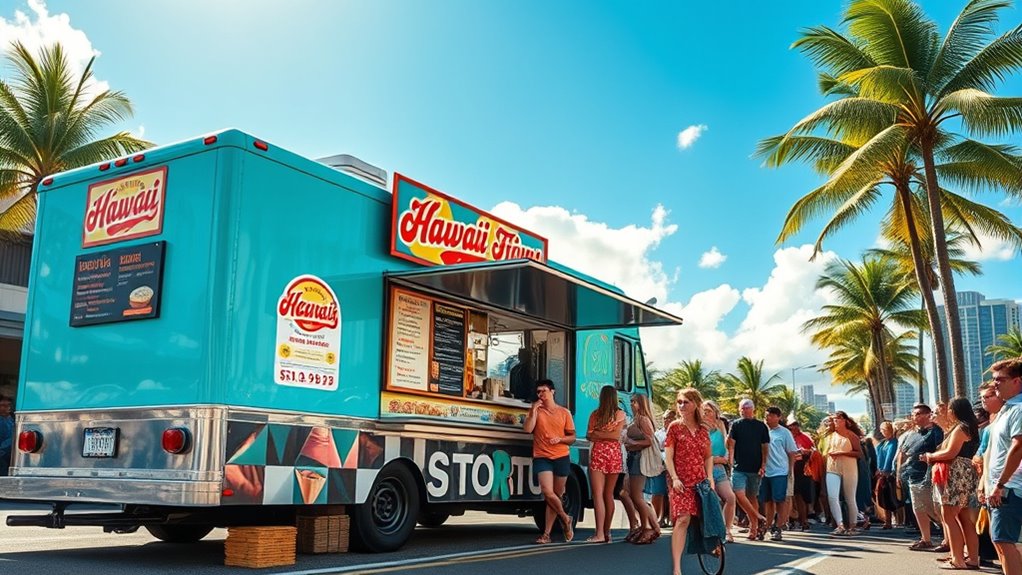
To get your food truck on the road, you’ll need to consider your initial vehicle purchase costs and explore local financing options. Securing the right liability insurance is also crucial to protect your business and comply with regulations. Understanding these financial aspects will help you build a solid budget and start your venture with confidence. Additionally, researching Forsale 100 can help you find cost-effective vehicle options and supplies to support your startup.
Initial Vehicle Purchase Costs
Purchasing a food truck in Honolulu requires careful budgeting, as vehicle costs can vary widely based on whether you buy new or used. The initial purchase price is just the start; you also need to take into account ongoing expenses like vehicle maintenance. When negotiating procurement, aim to get the best deal, especially on used trucks, which often have more room for price negotiations. Be sure to inspect the truck’s condition thoroughly, focusing on engine health and essential systems. Additionally, consider factors like fuel efficiency and customization costs. Proper planning ensures you avoid unexpected expenses that could strain your budget. Remember, a well-chosen vehicle lays the foundation for a successful food truck business and helps you manage costs effectively from the start.
- Vehicle condition and inspection
- Negotiation strategies
- Budgeting for maintenance and upgrades
Local Food Truck Financing Sources
Securing financing is a key step once you’ve identified a suitable food truck and planned your budget. Fortunately, there are several local food truck financing sources available in Honolulu to help you get started. You can explore funding options like small business loans from local banks or credit unions, which often prioritize small-scale entrepreneurs. Additionally, consider applying for grants or community development programs that support local food businesses. Some equipment vendors also offer leasing or financing plans tailored for food trucks. Crowdfunding platforms can be an effective way to raise funds from your community and future customers. By researching these local food truck financing sources, you’ll find the right funding options to cover your initial costs and set your food truck business on a solid financial footing.
Liability Insurance for Food Trucks
Since liability insurance is essential for protecting your food truck business, including coverage for accidents, injuries, and property damage, budgeting for this expense is a key part of your overall financial plan. Proper liability coverage safeguards you from potential lawsuits and claims, especially as parking regulations in Honolulu can be strict. Ensuring you meet local requirements helps avoid fines or penalties. When choosing liability insurance, consider factors like coverage limits and deductibles to match your budget and risk level. Keep in mind that insurance costs can vary based on your truck’s size, location, and operations. Planning ahead for these expenses will help you stay compliant and financially protected.
- Understand local parking regulations and their impact on insurance needs
- Select liability coverage that fits your budget and risk profile
- Factor in insurance costs when budgeting for your food truck startup
Designing Your Menu and Pricing Strategy
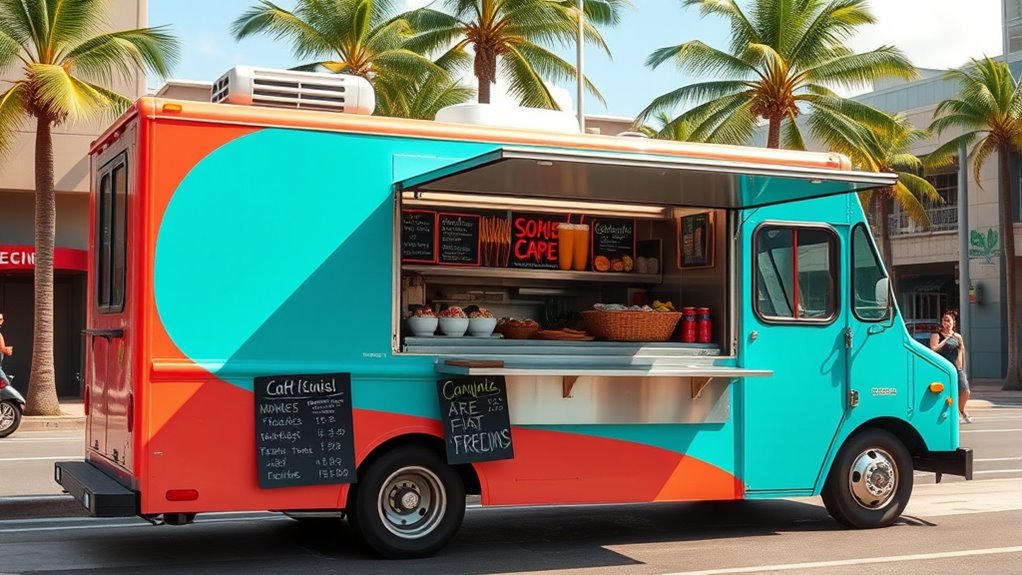
When designing your menu, focus on sourcing local ingredients to appeal to Hawaii’s food scene and support nearby farmers. Keep an eye on profit margins for each item to guarantee your prices cover costs while remaining competitive. Balancing quality and affordability is key to attracting loyal customers and boosting your truck’s success. Incorporating cost-effective ingredients can help optimize your pricing strategy without compromising on quality.
Locally Sourced Ingredients
Using locally sourced ingredients can substantially enhance your menu’s appeal and authenticity in Honolulu. Emphasizing sustainable sourcing and a farm-to-table approach strengthens your brand and attracts customers who value freshness and community support. When designing your menu and pricing strategy, focus on highlighting these ingredients to justify premium prices and create unique dishes. Incorporate local produce, seafood, and herbs to showcase Hawaii’s rich flavors. This not only differentiates your truck but also fosters relationships with local farmers and suppliers. Consider seasonal menus that adapt to available ingredients, reducing costs and waste. By prioritizing locally sourced ingredients, you’ll build a reputation for quality, sustainability, and authenticity that resonates with both locals and tourists alike.
- Highlight seasonal ingredients on your menu
- Partner with local farmers for fresh supplies
- Educate customers on the benefits of farm-to-table dining
Menu Item Profit Margins
Designing your menu and setting the right prices are key to guaranteeing your food truck remains profitable while showcasing locally sourced ingredients. To maximize your menu item profit margins, you need to conduct a thorough ingredient cost analysis. This helps you understand the true cost of each dish, including sourcing and preparation expenses. By knowing your ingredient costs, you can price your menu items strategically to cover expenses and generate profit. Focus on balancing popular items with higher profit margins and consider portion sizes to optimize revenue. Regularly review your costs and adjust prices accordingly to stay competitive and maintain profitability. A well-planned menu with carefully calculated prices ensures your food truck thrives in Honolulu’s vibrant street food scene.
Technology and Operations
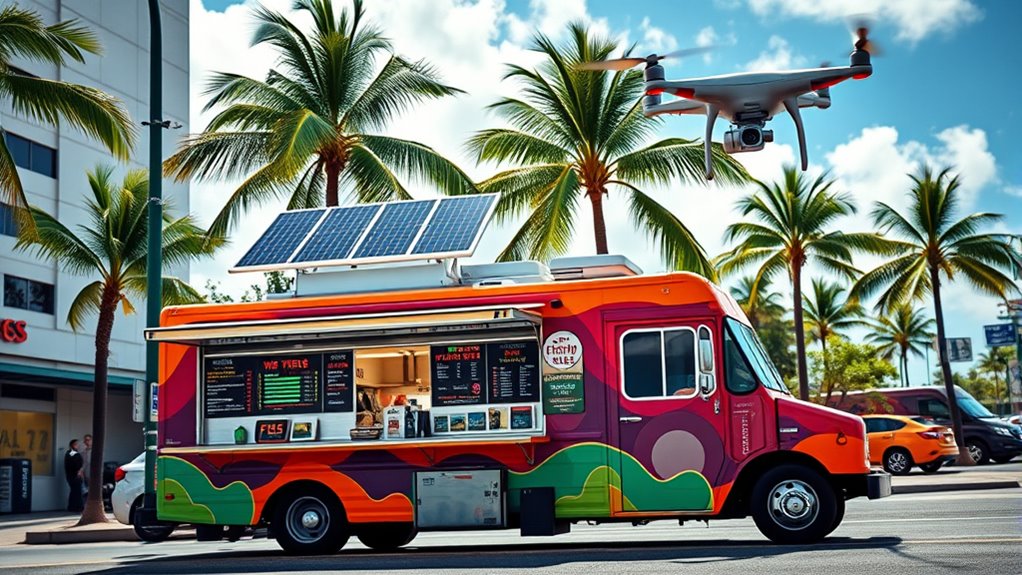
To keep your food truck running smoothly, you’ll want to choose a wireless payment app that’s compatible with various devices to make transactions quick and easy. Real-time stock tracking software helps you stay on top of inventory levels, so you don’t run out of popular items. These tools streamline your operations, saving you time and reducing errors on busy days.
Wireless Payment App Compatibility
Ensuring your food truck’s payment system is compatible with popular wireless payment apps is essential for smooth operations and customer satisfaction. Mobile payment options like Apple Pay, Google Pay, and Samsung Pay enable customers to make contactless transactions quickly and securely. Compatibility guarantees you won’t miss out on sales from customers preferring contactless methods. To optimize your setup, consider:
- Choosing a payment processor that supports multiple wireless payment apps
- Ensuring your POS system accepts contactless transactions seamlessly
- Regularly updating software for security and compatibility
Real-Time Stock Tracking Software
Implementing real-time stock tracking software is essential for maintaining efficient operations and minimizing waste. This technology enhances your inventory management by providing instant updates on stock levels, so you know exactly when to reorder supplies. It also improves supply chain coordination, ensuring that ingredients arrive on time and in the right quantities. With real-time data, you can quickly identify shortages or overstock issues, reducing spoilage and unnecessary expenses. By streamlining inventory management, you save time and avoid disruptions during busy hours. This software helps you make informed purchasing decisions, optimize stock levels, and keep your menu running smoothly. Overall, investing in real-time stock tracking software keeps your food truck well-stocked, responsive, and competitive in Honolulu’s bustling food scene.
Marketing and Growing Your Presence
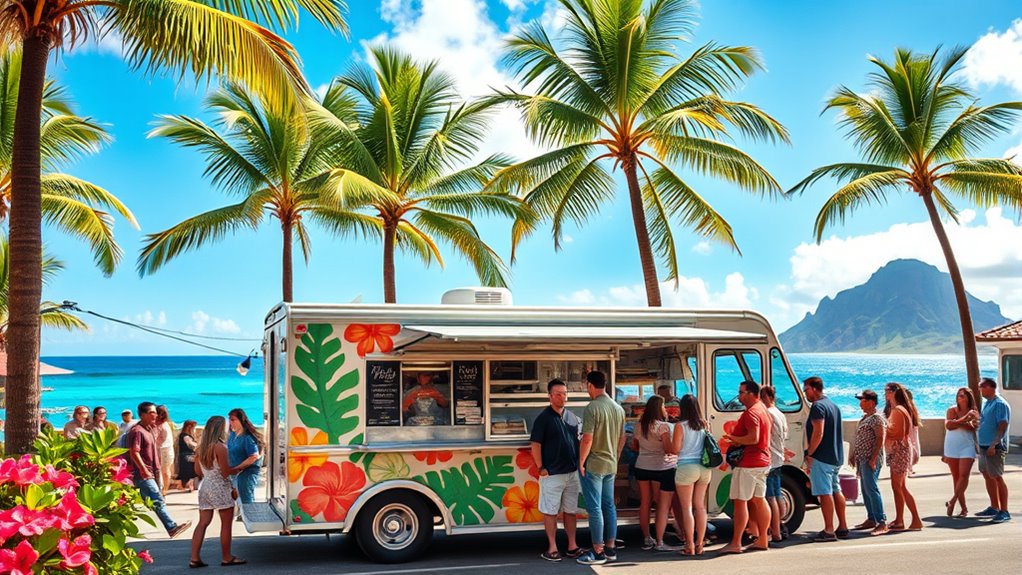
You can boost your visibility by aligning your schedule with popular local events, drawing in crowds enthusiastic for your food. Implementing customer loyalty programs encourages repeat business and builds a dedicated following. By focusing on these strategies, you’ll grow your presence and turn first-time customers into regulars.
Popular Local Event Schedules
To effectively grow your food truck’s presence in Honolulu, aligning your schedule with popular local events is essential. Participating in well-attended events increases visibility and connects you with the community. Look out for local music festivals, which draw large crowds enthusiastic for diverse food options. Cultural festivals also offer prime opportunities to showcase your menu and celebrate Hawaiian traditions. Planning your truck’s schedule around these events ensures steady customer flow and brand recognition. Consider the following opportunities:
- Local music festivals and concerts
- Cultural festivals and parades
- Food and craft fairs
Customer Loyalty Programs
Building a strong customer loyalty program is one of the most effective ways to grow your food truck’s presence in Honolulu. By offering customer rewards and loyalty rewards, you encourage repeat business and build lasting relationships. Consider a program where customers earn points for each purchase, which they can redeem for free items or discounts. To make it engaging, create tiers that gain access to special perks. Here’s a simple example:
| Points Earned | Reward |
|---|---|
| 50 | Free drink |
| 100 | Discount on next meal |
| 200 | Free main course |
| 300 | Exclusive event invite |
| 500 | VIP status |
This structure keeps your customers motivated and coming back for more.
Savor Honolulu’s Food Truck Future
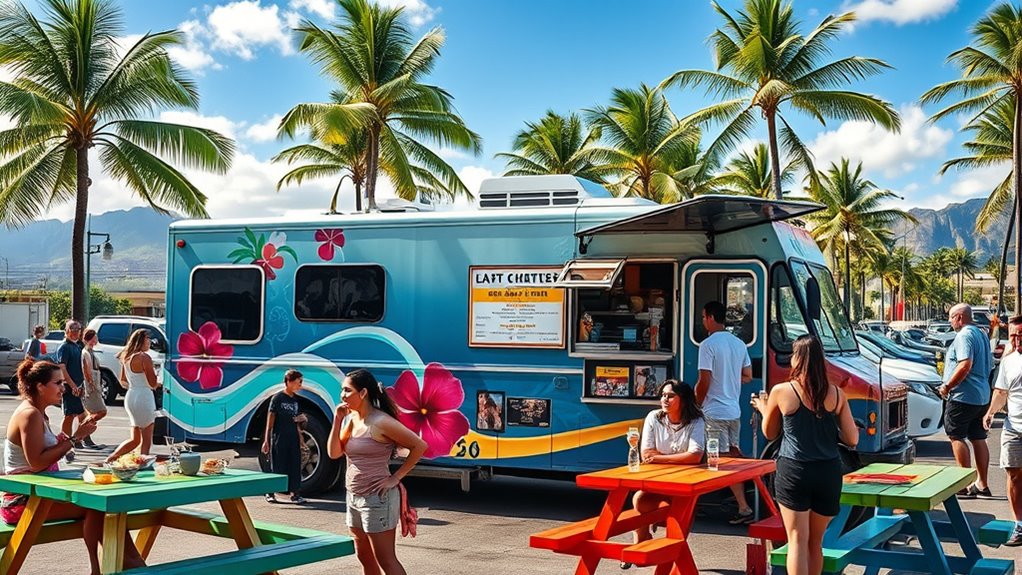
Honolulu’s vibrant food truck scene is poised for continued growth as local entrepreneurs and talented chefs embrace innovation and sustainability. To stand out, focus on strong food truck branding that highlights your unique cuisine and Hawaii’s culture. Engaging with your community through social media helps build a loyal following and keeps customers informed about your locations and specials. The future of Honolulu’s food trucks lies in creative menus that reflect local flavors and eco-friendly practices. You can also collaborate with other vendors or participate in food festivals to increase visibility. Staying ahead of trends and emphasizing quality will ensure your truck thrives in this competitive market. By leveraging social media engagement and sharp branding, you’ll savor a successful future in Honolulu’s dynamic food truck scene.
- Unique branding that captures local culture
- Active social media presence and updates
- Eco-friendly practices and local collaborations
Frequently Asked Questions
What Permits Are Unique to Honolulu’s Food Truck Regulations?
Honolulu regulations require you to obtain specific food truck permits, including a Mobile Food Vendor License and a Special Food Service Permit. You must also pass health inspections and secure a Honolulu County Business License. Unique to Honolulu are rules about parking and operating hours, especially near beaches and parks. Make sure you check with the Department of Planning and Permitting for any additional permits or restrictions specific to Honolulu’s food truck regulations.
How Do Local Weather Patterns Affect Food Truck Operation Hours?
Did you know Honolulu experiences about 70 inches of rainfall annually? This seasonal climate and rainfall patterns can considerably impact your food truck hours. During heavy rains, you might see decreased customer turnout, so it’s smart to adjust your schedule accordingly. Planning around the wetter months ensures you maximize profits, and staying flexible helps you adapt to Honolulu’s unique weather, keeping your food truck running smoothly year-round.
Are There Any Specific Health Codes for Mobile Food Vendors in Honolulu?
In Honolulu, you must follow specific health codes for mobile food vendors, including maintaining proper food truck sanitation standards. You’ll need to obtain a valid mobile vending license from the local health department, which oversees compliance with sanitation and safety regulations. Regular inspections ensure your food truck meets these standards, helping you operate legally and keep customers safe. Make sure to stay updated on any local health code changes to avoid penalties.
What Are the Common Challenges Faced by Food Trucks in Honolulu?
You face challenges like unpredictable weather and limited parking, which test your resilience. Balancing a seasonal menu keeps customers engaged but demands flexibility and quick adaptation. Steering Honolulu’s health codes adds pressure, yet focusing on customer engagement helps build loyalty amid stiff competition. Staying adaptable, managing costs, and offering diverse options are key to overcoming these hurdles and thriving in the vibrant food truck scene.
How Can I Build Relationships With Local Suppliers and Farmers?
You can build relationships with local suppliers and farmers by engaging with the community through events and farmer’s markets. Prioritize sourcing strategies that emphasize supporting local businesses, which helps you establish trust and loyalty. Consistently communicate your appreciation for local produce and participate in community engagement efforts. This approach not only strengthens your supply chain but also boosts your reputation as a committed, community-oriented food truck owner.
Conclusion
Starting your food truck in Honolulu is like planting a seed in a vibrant garden—you’ll nurture it with passion, creativity, and persistence. As your flavors and reputation grow, so will your journey through the island’s bustling streets. Embrace the adventure, stay adaptable, and watch your food truck flourish amid Hawaii’s rich culinary landscape. With dedication, you’re not just serving food—you’re cultivating an unforgettable experience that keeps customers coming back for more.
